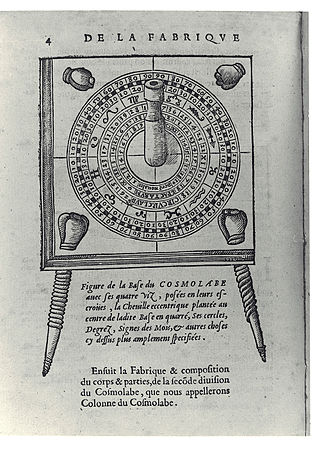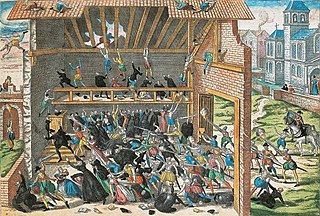Related Research Articles

John Calvin was a French theologian, pastor and reformer in Geneva during the Protestant Reformation. He was a principal figure in the development of the system of Christian theology later called Calvinism, including its doctrines of predestination and of God's absolute sovereignty in the salvation of the human soul from death and eternal damnation. Calvinist doctrines were influenced by and elaborated upon the Augustinian and other Christian traditions. Various Congregational, Reformed and Presbyterian churches, which look to Calvin as the chief expositor of their beliefs, have spread throughout the world.

Theodore Beza was a French Calvinist Protestant theologian, reformer and scholar who played an important role in the Protestant Reformation. He was a disciple of John Calvin and lived most of his life in Geneva. Beza succeeded Calvin as the spiritual leader of the Republic of Geneva.

William Farel, Guilhem Farel or Guillaume Farel, was a French evangelist, Protestant reformer and a founder of the Calvinist Church in the Principality of Neuchâtel, in the Republic of Geneva, and in Switzerland in the Canton of Bern and the Canton of Vaud. He is most often remembered for having persuaded John Calvin to remain in Geneva in 1536, and for persuading him to return there in 1541, after their expulsion in 1538. They influenced the government of Geneva to the point that it became the "Protestant Rome", where Protestants took refuge and dissidents such as Catholics and unitarians were driven out; some of the Catholics and Unitarians were even killed for their beliefs. Together with Calvin, Farel worked to train missionary preachers who spread the Protestant cause to other countries, and especially to France.

Jean-Henri Merle d'Aubigné was a Swiss Protestant minister and historian of the Reformation.

Jacques Besson (1540?–1573) was a French Protestant inventor, mathematician, and philosopher, chiefly remembered for his popular treatise on machines Theatrum Instrumentorum (1571–1572), which saw many reprints in different languages.

The Massacre of Vassy was the murder of Huguenot worshippers and citizens in an armed action by troops of the Duke of Guise, in Wassy, France on 1 March 1562. The massacre is identified as the first major event in the French Wars of Religion. The series of battles that followed concluded in the signing of the Peace of Amboise on 19 March 1563.
Claude de Sainctes was a French Catholic controversialist.
Henry Scrimgeour or Scrymgeour was a diplomat and book collector.
Christopher Goodman BD (1520–1603) was an English reforming clergyman and writer. He was a Marian exile, who left England to escape persecution during the counter-reformation in the reign of Queen Mary I of England. He was the author of a work on limits to obedience to rulers, and a contributor to the Geneva Bible. He was a friend of John Knox, and on Mary's death went to Scotland, later returning to England where he failed to conform.
Lambert Daneau was a French jurist and Calvinist theologian.

The French Protestant Church of London is a Reformed / Presbyterian church that has catered to the French-speaking community of London since 1550. It is the last remaining Huguenot church of London. Its current temple in Soho Square is a Grade II* listed building designed by Aston Webb and erected in 1891–93.

Antoine de la Roche Chandieu was a French Reformed theologian, poet, diplomat and nobleman. His trend toward the Reformed Protestantism was strengthened during his study of law at Toulouse; after a theological course at Geneva, he became the pastor of the Reformed congregation of Paris between 1556 and 1562.
Augustin Marlorat du Pasquier was a French Protestant reformer, executed on a treason charge.

Simon Goulart was a French Reformed theologian, humanist and poet.

Théodore Tronchin (1582–1657) was a Genevan Calvinist theologian, controversialist and Hebraist.

The Genevan Consistory is a council of the Protestant Church of Geneva similar to a synod in other Reformed churches. The Consistory was organized by John Calvin upon his return to Geneva in 1541 in order to integrate civic life and the church.

The Company of Pastors or Venerable Company is an organization, comparable to a classis, of ministers and deacons of the Protestant Church of Geneva. It was established as part of the implementation of John Calvin's Ecclesiastical Ordinances in 1541 and originally consisted of the ministers of Geneva's three city churches and a dozen countryside parishes. It met every Friday morning to examine candidates for ministry and discuss the theological and practical business of the church. In 1559 professors of the Genevan Academy were made members of the company. The company's powers were drastically reduced in the nineteenth century.
Michel Cop was a Swiss Protestant Reformer. He was brother of Nicolas Cop and friend of John Calvin.
Charles Perrot (1541–1608) was a French Reformed minister who served in the Republic of Geneva.

Benoît Textor or Tessier Latinized as Benedictus Textorius Segusianus was a French physician and naturalist. He was a friend of John Calvin and Pierre Viret. He took an interest in the study of birds and compiled a work along with his son Claude Textor (1538–c.1576) and Jean Tagaut, the son of his teacher.
References
- 1 2 Manetsch, Scott M. (2013). Calvin's Company of Pastors: Pastoral Care and the Emerging Reformed Church, 1536-1609. Oxford University Press. p. 40.
- Pierre Bayle, Dictionnaire Hist. et crit.
- Jean Senebier, Hist. littéraire de Genève (1786)
- Nouvelle Biog. gen. (1857).
- This article incorporates text from a publication now in the public domain : Chisholm, Hugh, ed. (1911). "Gallars, Nicolas des". Encyclopædia Britannica . Vol. 11 (11th ed.). Cambridge University Press. p. 413.
- Des Gallars, Nicolas, in the Historical Dictionary of Switzerland.